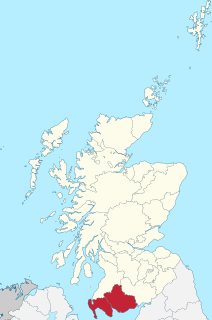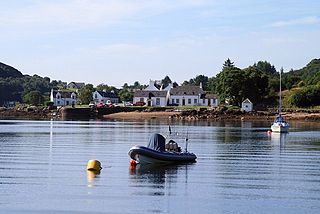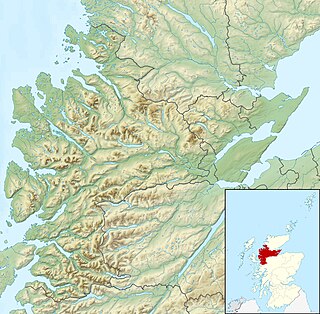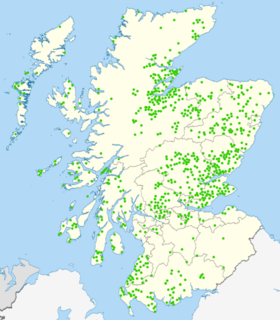
Acarsaid or An Acarsaid is a common toponym in the Scottish Highlands. It means literally "anchorage" or "harbour" in Scottish Gaelic, and comes from the Old Norse akkarsaeti, meaning literally "anchor-seat". [1]

Acarsaid or An Acarsaid is a common toponym in the Scottish Highlands. It means literally "anchorage" or "harbour" in Scottish Gaelic, and comes from the Old Norse akkarsaeti, meaning literally "anchor-seat". [1]
The head of government is either the highest or second highest official in the executive branch of a sovereign state, a federated state, or a self-governing colony, autonomous region, or other government who often presides over a cabinet, a group of ministers or secretaries who lead executive departments. "Head of government" is often differentiated from "head of state", as they may be separate positions, individuals, or roles depending on the country.
A unitary authority is a type of local authority that has a single tier and is responsible for all local government functions within its area or performs additional functions which elsewhere in the relevant country are usually performed by national government or a higher level of sub-national government.
A marquess is a nobleman of high hereditary rank in various European peerages and in those of some of their former colonies. The term is also used to translate equivalent Asian styles, as in Imperial China and Imperial Japan. The German language equivalent is Margrave.
Johnson is a surname of English, Scottish origin. The name itself is a patronym of the given name John, literally meaning "son of John". The name John derives from Latin Johannes, which is derived through Greek Ἰωάννης Iōannēs from Hebrew יוחנן Yohanan, meaning "Yahweh has favoured". The name has been extremely popular in Europe since the Christian era as a result of it being given to St John the Baptist, St John the Evangelist and nearly one thousand other Christian saints. Johnson is the second most common in the United States and 154th most common in the world. As a Scottish family name, Johnson is occasionally a variation of Johnston, a habitational name.

Galloway is a region in southwestern Scotland comprising the historic counties of Wigtownshire and Kirkcudbrightshire.

Eriskay, from the Old Norse for "Eric's Isle", is an island and community council area of the Outer Hebrides in northern Scotland with a population of 143, as of the 2011 census. It lies between South Uist and Barra and is connected to South Uist by a causeway which was opened in 2001. In the same year Ceann a' Ghàraidh in Eriskay became the ferry terminal for travelling between South Uist and Barra. The Caledonian MacBrayne vehicular ferry travels between Eriskay and Ardmore in Barra. The crossing takes around 40 minutes.

Rona, sometimes called South Rona to distinguish it from North Rona, is a small inhabited island in the Scottish Inner Hebrides. It lies between the Sound of Raasay and the Inner Sound just north of the neighbouring island of Raasay and east of the Trotternish peninsula of Skye. It has a total area of 930 hectares (3.6 sq mi) and a population of 3.

Traditional rank amongst European royalty, peers, and nobility is rooted in Late Antiquity and the Middle Ages. Although they vary over time and among geographic regions, the following is a reasonably comprehensive list that provides information on both general ranks and specific differences.
The Primus of the Scottish Episcopal Church, styled "The Most Reverend the Primus of the Scottish Episcopal Church", is the presiding bishop of the Scottish Episcopal Church. The current Primus is the Most Revd. Mark Strange who became primus on 27 June 2017.

Isleornsay is a village lying off the main Armadale to Sleat road on the Isle of Skye in Scotland. It overlooks, but is not upon, the island of Ornsay. The island itself shelters one of the best natural harbours in southern Skye. The location was exploited from the 18th century or earlier by the MacDonalds who owned this part of Skye.

A teahouse or tearoom is an establishment which primarily serves tea and other light refreshments. A tea room may be a room set aside in a hotel especially for serving afternoon tea, or may be an establishment which only serves cream teas. Although the function of a tearoom may vary according to the circumstance or country, teahouses often serve as centers of social interaction, like coffeehouses.

Chapeau is a French term signifying a hat or other covering for the head.

An Comunn Gàidhealach, commonly known as An Comunn, is a Scottish organisation that supports and promotes the Scottish Gaelic language and Scottish Gaelic culture and history at local, national and international levels. The society is closely associated with the Royal National Mòd. The symbol used for An Comunn Gàidhealach is the Irish Sunburst flag at the top also a symbol associated in Irish mythologyand the Celtic harp on the bottom right.

Tanera Mòr is an uninhabited island in Loch Broom in the Inner Hebrides of Scotland. It is the largest of the Summer Isles and was the last inhabited island in that group. Tanera Mòr has issued its own postage stamps and was the location of Frank Fraser Darling's book Island Years. In 2014, it was reported that it was sold for 1.6 million to millionaire Ian Wace
An ex officio member is a member of a body who is part of it by virtue of holding another office. The term ex officio is Latin, meaning literally 'from the office', and the sense intended is 'by right of office'; its use dates back to the Roman Republic.
Johnny Cochrane was a Scottish football manager.

Margaree Harbour is a small community in the Canadian province of Nova Scotia, located in Inverness County on Cape Breton Island.

Shunacadie is a community in the Canadian province of Nova Scotia, located in the Cape Breton Regional Municipality on Cape Breton Island.
The skalk refers to the Scottish Hebridean tradition of drinking a dram of whisky as an aperitif before breakfast. The word is an anglicization of the Scots Gaelic word scailg meaning literally "a sharp blow to the head." The tradition was notably observed by the English writer Samuel Johnson during his tour of the Western Isles of Scotland. In his A Journey to the Western Islands of Scotland, Johnson remarks that "A man of the Hebrides, for of the woman's diet I can give no account, as soon as he appears in the morning, swallows a glass of whisky; yet they are not a drunken race, at least I never was present at much intemperance; but no man is so abstemious as to refuse the morning dram, which they call a skalk." In modern usage, the term skalk is used in Scotch whisky drinking culture to refer to a casual glass of whisky in the morning.

Scottish toponymy derives from the languages of Scotland. The toponymy varies in each region, reflecting the linguistic history of each part of the country.
| Look up acarsaid in Wiktionary, the free dictionary. |
| This Highland location article is a stub. You can help Wikipedia by expanding it. |